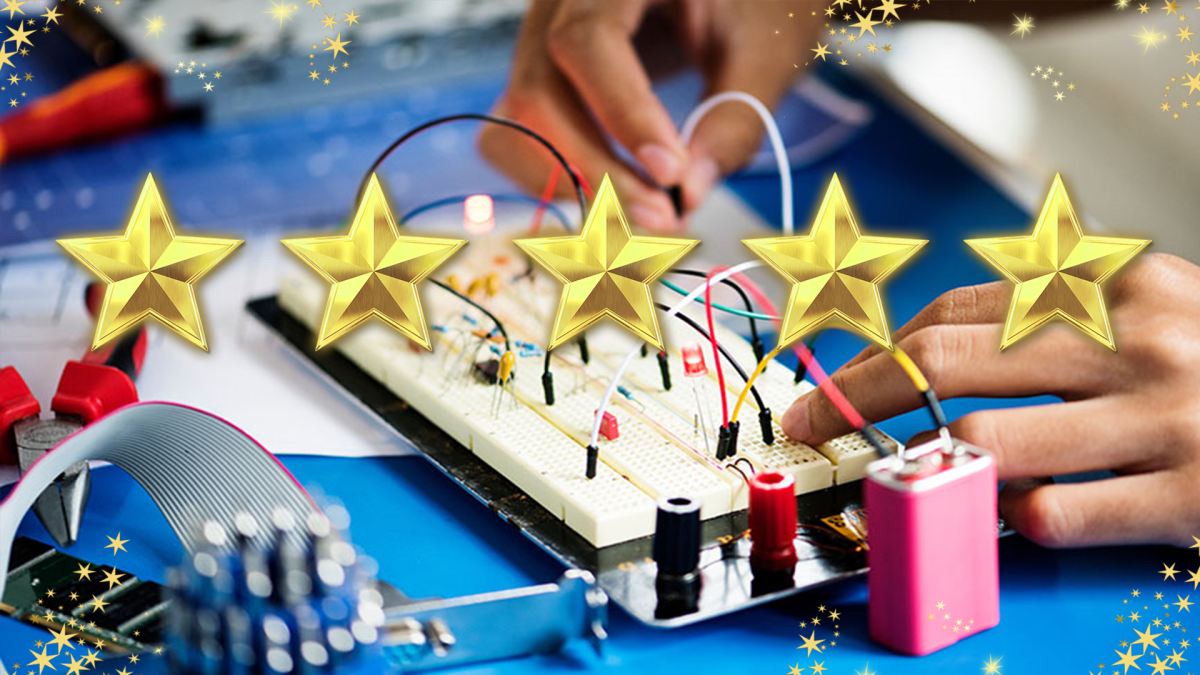This lesson is a 3-4 day lesson on Public Service Announcements for reusing commonly discarded item versus trashing them. The lessons include the power of a Public Service Announcement, components to
Students have the opportunity explore different materials that use nanotechnology and then discuss the key differences between macroscale and nanoscale impacts on those materials.
This lesson uses a PhET Simulation to allow students to collect data on the orbits of planets around our Sun, then summarize and share their results. It is designed for students in Grades 9-12.
Students are introduced to the concept of nanotechnology with a small group research activity about the different industries using nanotechnology.
Students will explore beginning coding thru binary coding and creating a name bracelet.
Students will learn about the light sensor on the Circuit Playground Express and how it can be used as an automatic switch to turn a device on or off. They will learn about the thermometer sensor on
Students will learn and recall about the different parts and components of an Adafruit Circuit Playground Express. Students will be able to program an Adafruit Circuit Playground Express
This lesson is designed around competition. Competition is a driving force behind natural selection. If something can survive to reproduce, the traits are passed on. Students will be completing
After learning about the importance of clean water and different types of filters, students engineer their own water filter.
This is the first of 4 lessons where students will propose and configure a school garden using criteria given by the principal. Students will work in groups of 3 to determine configurations. They will
Students will be using simple equipment to demonstrate the 3 laws of motion. They will be incorporating technology, math, and the scientific method to demonstrate what they know.
Volcanoes: Studying Viscosity of Lava & Magma and how it relates to The San Francisco Volcanic Field
This lesson allows students to explore why volcanoes are shaped differently and why they erupt differently. Students will investigate viscosity, silica content of igneous rock samples, and perform
Students will explore how gravity plays a role in orbits and the attraction between objects in space, using online simulations. In addition to the online simulations this lesson contains ideas for
In this lesson, students work with an assigned customer to create a 3D-printed nameplate. Working through the steps of the engineering design process, students use a 3D modeling software, Tinkercad
This lesson is intended to teach students about how mass and unbalanced forces affect the motion of objects (inertia) and Newton's First Law of motion. Students will have student-to-student
This lesson teaches students how and why it rains. They will have student-to-student interactions and hands-on learning opportunities. They will also be practicing their counting skills during the
The lesson helps students investigate the purpose of conductors and insulators in various practical applications. The first part of the lesson is to introduce vocabulary and explain its relationship
This lesson is simple lesson plan for 4th grade students. It will challenge students to investigate and demonstrate that electricity is a flow of electrons around the circuit. This lesson will be 50
Students identify the problem with drinking water contamination due to pesticide, prescription medicine, and hormones. They design solutions for a real-world problem that negatively affects the
In this lesson plan, students will be able to build a simple electric motor and study how simple changes affect the motor's rotation. They will learn how energy comes in many forms, and how electric
In this lesson plan, students will be able to investigate battery cells as they construct their own simple batteries: They will know that batteries are a common store of energy for many devices that
Students will be able to collaboratively build, and program a simple robot using Lego Spike Prime kits. Students will demonstrate basic skills in robotics and coding by successfully constructing their
By the end of this lesson, students will understand the unique adaptations of desert tortoises and the importance of conserving their habitat. Students also engineer a habitat for the desert tortoise.
Student teams design insulated beverage cups with the challenge to test them to determine which material works best as an insulator to keep a hot beverage warm for as long as possible. Students test
Featured Lesson Plans
Check out these notable lesson plans.

This is a great opportunity to show students that coding can be a lot of fun, and it doesn’t have to be scary. Many high school students with little to no prior coding experience often automatically

A Shocking Dystopia: STEM Adventures in The City of Ember Part 4 of 4: Where the River Goes
This lesson is PART 4 of a four-lesson unit, which focuses on futures thinking, the phenomenon of electricity, closed-system agriculture, and water as a renewable energy resource. “The City of Ember”

A Shocking Dystopia: STEM Adventures in The City of Ember Part 3 of 4: A Problem in the Greenhouse
This lesson is PART 3 of a four-lesson unit, which focuses on futures thinking, the phenomenon of electricity, closed-system agriculture, and water as a renewable energy resource. “The City of Ember”
